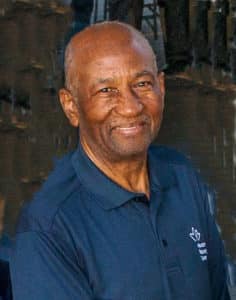As part of our 7th anniversary issue, we talk with Executive Director Leonard Kincaid on his inspiration, lessons learned, and his dream for Houston Recovery Center.
 Who provides you the greatest inspiration and why?
Who provides you the greatest inspiration and why?
LK: Our clients, staff and community partners.
Our clients’ lives are transforming as a result of our intervention. Bright light comes to their face again, they are getting into recovery and getting jobs and housing. I can’t think of anything greater than seeing that transformation.
And Houston Recovery Center staff. They do the frontline work, the one-on-one engagement with clients, facilitating the greatest amount of change. Their work allows us to have our great reputation in the community.
I’m also inspired watching our staff grow – their willingness to learn and be motivated to succeed. We established ourselves as a learning laboratory from the beginning. A lot of staff have taken that to heart by going back to school and pursuing academic degrees– from leadership to the frontline.
Community partners also inspire me. All of them see value in what we do and have chosen to be a part of us. These relationships helped contribute to our service model success.
In the last seven years, what are some lessons you’ve learned related to Houston Recovery Center?
LK: Regarding staff, it’s critical to have structure that provides clear expectations in what employees’ roles are. Our service model is the first of its kind in Houston or the country, to the best of my knowledge. So, we had to develop all the rules ourselves, but modeled them after other sobering centers in the country.
Another lesson was the need for processes that helped hold staff accountable, which is essential in managing a team. We were trying to create something new, based on compassion, dignity and respect. Holding people accountable to these values allowed the culture to take root.
On the service side, we had the right idea when we created our comprehensive service system. People coming through [the sobering center] over and over allowed us to create a service model to serve them. The plan had to respond to every aspect of their lives.
What is your dream for Houston Recovery Center?
LK: My dream has evolved over time. It keeps getting reshaped by outcomes produced by the comprehensive service system and our Partners in Recovery Program service model.
Now that we know we can achieve positive behavior change in this particularly challenging population, we need to be able to scale the model and expand our reach with the partners who refer to us. For example, our Frontline project sends staff to hospitals to offer help to individuals transported by HFD after an opioid overdose. Our service expansion option would be to become a resource for the hospital in developing and managing a care plan post-discharge for their other patients that are substance use dependent.
We have the foundation. The service model is exactly what I want for the dream. It is now time to build it out on the receiving end (our source of clients) and the referral end where we place clients for care.
What do you want the community to know about Houston Recovery Center and how can they help?
LK: What is important to know is the sobering center is a safe place for intoxicated individuals to sober up, avoid jail and keep their jobs. But we don’t stop there. Unpredictable environmental and economic disruptions coupled with dangerous drug trends become a life and death matter for many.
So we conduct outreach across community settings to reach people vulnerable to engaging in harmful and hazardous substance use. The way our intervention and recovery programs are structured and delivered is unique and timely in addressing the ongoing threats to our community.
Please visit our website to hear what our clients say and learn more about our work. We invite you to team up with us as a supporter in our fight to improve our community health and safety.
Any amount of giving helps us continue to reach people who think doors closed to them never open only to realize that healthy change is possible and real for them.